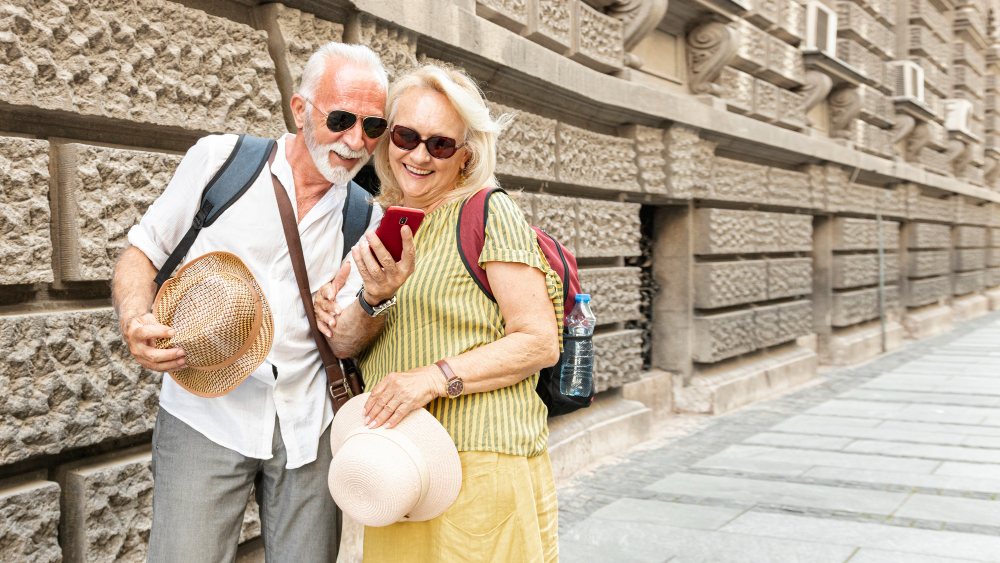
Paris, the City of Light, is a dream destination for travelers of all ages. But when planning a Senior Paris Travel, extra considerations ensure a comfortable, enjoyable, and memorable visit.
This guide addresses common questions and concerns, offering practical advice to make your Parisian adventure seamless.
Whether it’s your first trip or a return visit, these tips will help seniors make the most of their time in this enchanting city.
Common Questions and Concerns
Is Paris senior-friendly?
Absolutely! Senior Paris Travel city, offering numerous amenities to cater to older travelers. From accessible public transportation to senior discounts at museums and attractions, Paris ensures that seniors can enjoy the city comfortably.
Many hotels and public spaces are equipped with facilities to accommodate mobility needs, making it easier for seniors to navigate the city.
What is the best time to visit Paris for seniors?
The best time to visit Paris for seniors is during the shoulder seasons of spring (April to June) and fall (September to October). The weather is mild, the crowds are smaller, and it’s easier to navigate popular attractions.
Spring brings beautiful blooms in the gardens, while autumn offers a palette of vibrant fall colors. These seasons also tend to have more manageable temperatures, avoiding the extremes of summer heat and winter cold.
How can seniors stay safe in Paris?
Safety is a top priority for Senior Paris Travel.
Here are some essential tips:
- Stay in well-lit, central areas: Choose accommodations in neighborhoods known for their safety, such as the Marais, Saint-Germain-des-Prés, and the Latin Quarter.
- Avoid walking alone at night: Stick to well-populated and well-lit areas if you need to be out after dark.
- Keep personal belongings secure: Use a money belt or a secure bag to keep your valuables close. Be cautious of pickpockets, especially in crowded areas.
- Emergency contacts: Have travel insurance, keep emergency contact information handy, and know the location of the nearest hospital or clinic.
Travel Tips for Seniors
Choosing Accommodation
When selecting accommodation in Senior Paris Travel, consider the following:
Location
- Central Neighborhoods: Choose a hotel or apartment in central neighborhoods like the Marais, Saint-Germain-des-Prés, or the Latin Quarter. These areas are close to major attractions and offer easy access to public transportation, minimizing the need for extensive travel.
- Quiet Areas: For a more tranquil stay, consider neighborhoods like the 7th arrondissement (home to the Eiffel Tower) or the 16th arrondissement, which are slightly removed from the hustle and bustle but still conveniently located.
Accessibility
- Elevators: Ensure your accommodation has elevators, especially if it’s an older building without ground-floor rooms.
- Walk-in Showers: Look for properties with walk-in showers instead of bathtubs to reduce the risk of slipping.
- Minimal Stairs: Check for accommodations with minimal stairs, particularly if you have mobility issues.
Amenities
- Wi-Fi: Free Wi-Fi is essential for staying connected with family and friends back home.
- Breakfast Options: Accommodations that offer breakfast can be convenient, saving you time and effort in the morning.
- 24-hour Front Desk: A 24-hour front desk can be very helpful for any issues or questions that arise during your stay.
Navigating the City
Paris has an extensive public transportation system that is relatively senior-friendly.
Here are some tips to help you get around:
Metro
- Challenges: While the Metro is efficient, it can be challenging due to stairs and long corridors. Some older stations lack elevators and escalators.
- Alternatives: For seniors, buses and trams are more accessible and provide a scenic way to see the city.
Buses and Trams
- Accessibility: Buses and trams are wheelchair accessible and offer a comfortable way to explore the city. Many buses kneel to the curb to make boarding easier.
- Routes: Familiarize yourself with the main bus and tram routes to major attractions. Maps and schedules are available at stops and online.
Taxis and Ride-Sharing
- Convenience: Taxis and services like Uber are widely available and convenient for seniors who prefer direct transportation. They can be especially useful for late-night trips or when carrying heavy shopping bags.
- App Use: Download the apps for Uber or local taxi services before your trip. They offer reliable and safe transportation options.
Walking
- Pacing: Paris is a walkable city, but it’s essential to pace yourself. Take frequent breaks and enjoy the many benches and parks around the city.
- Footwear: Wear comfortable, supportive shoes to avoid fatigue and blisters.
Must-See Attractions
Paris is brimming with iconic sights, many of which are easily accessible for seniors.
Here are some must-see attractions:
Eiffel Tower
- Elevator Access: Seniors can take the elevator to the viewing platforms for stunning city views. Book tickets in advance to avoid long lines.
- Nearby Attractions: After visiting the Eiffel Tower, relax in the adjacent Champ de Mars park or take a leisurely stroll along the Seine River.
Louvre Museum
- Discounts: The Louvre offers senior discounts and has elevators and ramps for easy navigation. Consider joining a guided tour to learn more about the art and history.
- Accessibility: Maps highlighting accessible routes are available at the information desk. The museum also provides wheelchairs free of charge.
Notre-Dame Cathedral
- Exterior Views: While the interior is currently closed for renovations, the exterior and nearby attractions like Île de la Cité and Sainte-Chapelle are worth visiting.
- Boat Tours: Enjoy a Seine River cruise for a unique view of Notre-Dame and other landmarks.
Seine River Cruises
- Relaxation: Enjoy a relaxing boat tour along the Seine River, which provides excellent views of major landmarks. These cruises are wheelchair accessible and offer both day and evening options.
- Commentary: Many cruises offer audio guides in multiple languages, providing interesting historical and cultural insights.
Montmartre
- Artistic Hub: Explore the charming streets of Montmartre, home to artists and the iconic Sacré-Cœur Basilica. The funicular railway provides easy access to the hilltop.
- Cafés and Shops: Take a break at one of the many quaint cafés or browse the local art shops and galleries.
Dining and Cuisine
Paris offers a plethora of dining options catering to all tastes and dietary needs.
Here are some tips for enjoying Parisian cuisine:
Cafés and Bistros
- Traditional Cuisine: Enjoy traditional French cuisine in a relaxed setting. Many cafés have outdoor seating, perfect for people-watching and soaking in the Parisian atmosphere.
- Famous Dishes: Try classic dishes like coq au vin, boeuf bourguignon, and escargot. For dessert, indulge in a crème brûlée or a tarte Tatin.
Food Markets
- Local Flavors: Explore local food markets like Marché d’Aligre or Marché des Enfants Rouges for fresh produce and delicious street food. These markets offer a true taste of Parisian life.
- Picnics: Consider buying supplies for a picnic in one of Paris’s beautiful parks, such as Luxembourg Gardens or Parc des Buttes-Chaumont.
Special Diets
- Dietary Needs: Paris has a growing number of restaurants offering vegetarian, vegan, and gluten-free options. Research and make reservations in advance to ensure a stress-free dining experience.
- Online Reviews: Use apps and websites like TripAdvisor or Yelp to find restaurants that cater to specific dietary needs.
Health and Wellness
Maintaining health and wellness during your trip is crucial.
Here are some tips to stay healthy and comfortable:
Pharmacies
- Accessibility: Paris has numerous pharmacies where you can purchase over-the-counter medications and get health advice. Look for the green cross signs indicating a pharmacy.
- Medication: Bring enough prescription medication for the duration of your trip, along with a copy of your prescription.
Medical Services
- Hospitals and Clinics: Familiarize yourself with the locations of nearby hospitals and clinics. Major hospitals like Hôpital Européen Georges-Pompidou offer high-quality care.
- Travel Insurance: Ensure you have travel insurance that covers medical emergencies. Carry your insurance details with you at all times.
Rest Breaks
- Itinerary Planning: Plan your itinerary with ample rest breaks to avoid fatigue. Many attractions have seating areas and cafés nearby for a quick respite.
- Hydration: Stay hydrated, especially during the warmer months. Carry a refillable water bottle and take advantage of public water fountains.
Relatable Example
Imagine strolling down the charming streets of Montmartre, taking in the artistic atmosphere and picturesque views.
You stop at a quaint café for a leisurely lunch, savoring a croque-monsieur while enjoying the sounds of street musicians.
This slower pace allows you to soak in the essence of Paris without feeling rushed, making your trip both relaxing and memorable.

Day Trips from Paris
Consider taking a day trip to explore the beautiful surroundings of Senior Paris Travel:
Versailles
- Palace and Gardens: Visit the stunning Palace of Versailles and its expansive gardens. The palace offers mobility aids like wheelchairs and electric carts for the gardens.
- Accessibility: Book tickets in advance and use the RER train from Paris, which is equipped with elevators and accessible platforms.
Giverny
- Monet’s Gardens: Explore the picturesque village of Giverny, home to Claude Monet’s house and gardens. The site is accessible, with paved paths and benches for resting.
- Train Travel: Take a direct train from Paris to Vernon-Giverny, followed by a short bus or taxi ride.
Loire Valley
- Chateaux Tours: Discover the majestic chateaux of the Loire Valley. Many tour operators offer accessible transportation and guided tours tailored to seniors.
- Wine Tasting: Enjoy wine tastings at local vineyards, experiencing the region’s renowned wines.
Packing Tips for Seniors
Packing wisely can make your trip more comfortable:
Essential Items
- Comfortable Shoes: Bring supportive shoes suitable for walking and standing.
- Weather-Appropriate Clothing: Pack layers to accommodate changing weather. Include a lightweight raincoat and a warm jacket for cooler evenings.
- Medications: Carry enough prescription medication for the entire trip, along with a copy of the prescription.
- Travel Documents: Keep your passport, travel insurance, and emergency contact information in a secure but accessible place.
Travel Aids
- Mobility Devices: If needed, bring mobility aids like a cane or walker. Many airlines and hotels can accommodate these devices.
- Portable Chargers: Ensure your devices are always charged with a portable charger. This is especially useful for long days of sightseeing.
- Comfort Items: Bring items that add comfort, such as a travel pillow, compression socks, and a small blanket.
Cultural Tips
Understanding local customs and etiquette can enhance your experience:
Greetings
- Politeness: Always greet with a polite “Bonjour” (hello) when entering shops or restaurants.
- Respect: Use “s’il vous plaît” (please) and “merci” (thank you) to show respect and politeness.
Dining Etiquette
- Table Manners: Keep both hands on the table (but not elbows) during meals. It’s customary to finish everything on your plate.
- Tipping: Tipping is not mandatory but appreciated. Leaving a small amount of change or rounding up the bill is customary in cafés and restaurants.
Language
- Basic Phrases: Learn basic French phrases. Most Parisians appreciate the effort and are more likely to assist you.
- Language Apps: Use translation apps to help with communication if needed.
Encouraging Reader Interaction
Engage with readers by encouraging them to share their experiences and tips:
- Comment Section: Invite readers to share their own travel tips and experiences in the comments section.
- Social Media: Encourage readers to share their photos and stories on social media using a specific hashtag.
- Interactive Maps: Include interactive maps highlighting key attractions and recommended routes.
Keeping Content Up-to-Date
Ensure your guide remains relevant by:
- Regular Updates: Regularly update the guide with new information and tips.
- User Feedback: Incorporate feedback from readers to improve the content.
- Current Events: Stay informed about current events and changes in Paris that may affect travel plans.
By following this comprehensive guide, seniors can enjoy a stress-free and memorable trip to Paris, experiencing the city’s rich history, culture, and charm.
Whether you’re exploring iconic landmarks, savoring delicious cuisine, or simply soaking in the Parisian atmosphere, this guide ensures that your adventure is as enjoyable and comfortable as possible. Bon voyage!
Conclusion
Planning a Senior Paris Travel can be an incredibly enriching experience. The City of Light offers something for everyone, with its timeless beauty, rich history, and vibrant culture.
By taking into account the tips and advice provided in this guide, seniors can navigate the city with ease and confidence.
From choosing the right accommodation to exploring must-see attractions and savoring delicious cuisine, every aspect of the trip can be tailored to ensure comfort and enjoyment.
Remember to prioritize accessibility, safety, and health while embracing the adventure of discovering new places and experiences.
Engage with the local culture, savor the moments of relaxation, and don’t hesitate to take it slow—Paris is a city meant to be savored at your own pace.
Whether it’s your first visit or a return trip, Paris welcomes you with open arms and countless opportunities to create unforgettable memories.
So pack your bags, brush up on a few French phrases, and get ready to immerse yourself in all that this magnificent city has to offer. Bon voyage and enjoy every moment of your Parisian adventure!
Frequently Asked Questions
What are the best times to visit Senior Paris Travel?
The ideal times to visit Paris are during the late spring (May) and early summer (June), or in the fall (September to October).
These periods typically offer pleasant weather and fewer crowds, making it easier for seniors to navigate the city and enjoy outdoor activities.
How can I ensure a comfortable travel experience for seniors?
To ensure comfort, it’s crucial to plan ahead. This includes booking accommodations that cater to mobility needs, such as ground-floor rooms or those with elevators.
Consider hiring private drivers for transportation instead of using public transit, which may involve stairs and long walks.
Additionally, building in downtime during the itinerary allows seniors to rest and recharge throughout the day.
What types of accommodations are recommended for seniors?
Look for hotels that offer amenities such as breakfast included, easy access to public transportation, and features like walk-in showers.
It’s also beneficial to choose accommodations that replicate some comforts of home, such as seating options and proximity to dining options.
What activities are suitable for seniors in Paris?
Seniors can enjoy a variety of activities in Senior Paris Travel, including leisurely strolls along the Seine River, visits to iconic landmarks like the Eiffel Tower and Louvre Museum, and exploring charming neighbourhoods like Montmartre.
Private guided tours can enhance the experience by providing tailored insights while avoiding the stress of navigating large crowds.
How should I prepare for potential health needs while traveling?
Before travelling, consult with a healthcare provider about any specific health needs or medications required during the trip.
It’s advisable to carry a list of medications, along with prescriptions if necessary. Additionally, consider packing essential items like comfortable walking shoes, a portable seat or walker if needed, and a first-aid kit.










